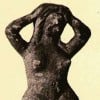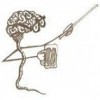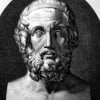If the Bible is the truth then why are there so many contradictions?
example: God sent his prophet to threaten David with how many years of famine?
* Seven (2 Samuel 24:13)
* Three (I Chronicles 21:12)The Hebrew language text 2 Samuel reads "seven" years of famine.
1 Chronicles probably a better preserved text.
Contradictions would more aptly describe two opposites. Yes or no?umm, which "Old Testament" are you reading hokey?
both say: three years of famine, three months running or three days of plague. So where is the Seven?The way I see it, the Bible is a collection of books of various subjects and disciplines including correspondence, history, poetry and allegories that was crafted by the Church to advance the cause of Christianity in the early days of the Roman Catholic Church.
While people look at the book as a whole item today, one has to remember it is a COLLECTION of books and not one single cohesive volume. In addition those books were authored by several different people many of whom may have been inspired to write them.
As far as contradictions go, stop thumping the Bible and discrediting it as a whole because someone's age isn't right in it. We can't get facts correct on things that happened a hundred years ago so cut them some slack. If you don't believe me try looking at any two encyclopedias and see how their so-called facts stack up to each other.
History is one of the most subjective compiled writings that exists. History is written usually by the winners and people with agendas. For example, read US History about the Alamo, then read a Mexican account of the Alamo. Kids are taught that Davy Crockett died fighting while the Mexicans say he was found cowering and executed after the battle. The Americans talk about a Revolution, the English look at us as rebellious children.
On the subject of divine inspiration, I believe the Bible is the writings of men who were inspired by something or someone. No one writes without an inspiration. It's rich in metaphor, allegory and literary devices just like any other literature.
Also, you all read an English translation of a book that has been translated from ancient Hebrew and Greek and from what I know, there is NOT a literal translation between the languages.
No two people will describe events the same way just like no two writers will describe the same event identically. We don't hold modern writers to that ideal, why are you doing it with people who were a lot simpler and just as inspired as all of us.
Why do you write? and who inspires you? and how do you know your facts are always right? See the problem.
That doesn't negate the spirit of the book in my humble opinion. The spirit of the book is to provide us with a compass for living a moral life emulating God and to teach us why to live that way and what happened before both good and bad.Notice how abysmal the bible's track record as a moral compass has been over the centuries?
Deleted
What i meant to say was, but nicely this time. the context is thousands of years. The bible is the basis for today's judicial system, which actually set morals as we know it.
In the olden days, you can push pretty virginal girls off a clif, disembowel your friend, eat the brains of live animals to pacify forces of nature and nobody would care.
Davidwpa~you are a very intelligent, and it seems, God fearing man. I can understand from a strictly academic view how many find conflict and fault within the pages of the Bible, and while finding fault miss the entire message. I encourage all of the commenters here to look at the Bible with a different perspective. It really is a life giving book. Thank you David for one of the best spins on this great, most read, most inspiring, and life changing book I've ever (literally) read. Keep studying and keep writing!
In the court system in the current age, witnesses are a major part of the outcome of a trial. If there are several eye witnesses in a case, their testimonies are very important. If all of the witnesses have identicial main themes and identical details, they would be suspected of collaboration (like in the Watergate Scandal). If however, all of the eye witnesses have the same main themes and only the details are different, their testimonies would be accepted as valid.
Different details from different writers seem like "contradictions" because they're written from different perspectives. The main ideas are identical, but the details are different. This enforces the truth of the writing, it doesn't take away from it.
I and II Kings and I and II Chronicles are accounts of the history of Israel. One is written from the perspective of the Northern Kingdom and the other from the Southern Kingdom.
The writers of the gospels have the same situation.I don't think that even our everyday fiction books have as many contradictions as the bible does.
If they did they would be laughed off the shelf and the author would be cleaning toilets.

It is my understanding that Ezra restored much of the ancient writings. He dictated this knowledge. I do not have any idea as to what books had to be restored and what ones did not. This may be the cause for some to the contradictions ????
Sounds good to me.I'm sure the bible have some thruths hidden deep inside.
the bible has contradictions, because life is contradictory in itself.
and Man the more !
I'm Great !!! Having a wonderful life. and wonderful news as well.
Can't ask for more
If you're so curious, I'll e-mail them to you

YES!!!! I wanna know!!!

Don't forget the pics of you with them. Ya know? Cahe always needs icing!!
Hokey: My best explanation is: Perhaps there is a balance to many of the contradictions. Would you be willing to say that some parts of the Bible are wise? Then, perhaps there are two sets of extremes to help guide the follower. Anyways...something to consider. Peace...Out!

"Must find balance first"
And then they rained down on Hokey - Irish 3:7: verse 6

How old was Jehoiachin when he became king of Jerusalem?
* Eighteen (2 Kings 24:8)
* Eight (2 Chronicles 36:9)Here come the twisted, nonsensical, desperate and deluded apologetics..
The funny thing is that I am not trying to start trouble. I am curious how this can be explained.
In what year of King Asa's reign did Baasha, King of Israel die?
* Twenty-sixth year (I Kings 15:33 - 16:8)
* Still alive in the thirty-sixth year (2 Chronicles 16:1)And then Hokey came down off the mount 2:6 Verse 8

The bible in it's entirety is the word of God. Individual verses of it are not. Is a slice of pie the same as a pie? Surely not. God is so great that even a book filled with lies, contradictions, and hatred can be formed into the ultimate, loving truth.
Thanks for asking.
Have a blessed day motherf***erSo none of it can be trusted, it would seem.
You know, if you subscribe to the 'blame the errors on man' theory.
Maybe man wrote the verses against homosexuality, how about that?
The question is flawed, because "truth" is relative. Don't confuse facts with truth.
That is why Christians can believe in it. Technical details, like ages or the weight in grams of Jesus' left shoe, do not matter so much as the point he's making, or perhaps more accurately, from the point being extracted from the words that are being attributed to him, whether accurate or not.The bible either is inspired and infallible, or it is not. Can't have it both ways.
That is a false binary. You are imposing an either / or that completely rules out the nature of both reason and reality. You suggest that something cannot be inspired and yet flawed, those two are not mutually exclusive. Furthermore, you are imposing rules on how a divine being can operate and assuming that you have the capacity with a mortal mind to fathom how that divine being puts his/her/its plan in place. What makes you so special that you get to decide that it has to be infallible by your definition or it is rendered moot for all the world?
I don't mean that last to sound snippy; it's not. I'm simply saying, it requires tremendous hubris to presume to define with such absolutism how the universe or a deity or even a potential deity must function.Maybe you misunderstood what I said. I said the bible either is infallible, or it is not. It either is inpired or it is not.
I did not say that something inspired could not be flawed.Fair enough. I stand corrected. Then what I should have said is that you have created two false binaries. I stand by the rest.
Who gets to be the final arbiter on whether or not it passes muster as infallible? Who get's to set what "infallible" means. Does infallible mean every single micro-fact must be historically verifiable by X number of sources? Or can its infallibility be tied to its moral potency? What if it's both? Do you get to be the final arbiter of all that?
Same for "inspired." What is inspired and how does one decide whether something is inspired or not? It seems ludicrous to want to argue that a holy text, from any religion, is not inspired, but I'll play along long enough to ask the same questions I did above. Who get's to define the terms by which humanity can count itself finally informed on the truth of the Bible's inspiration or having been inspired?Yeah sure, the bible is inspired except for any parts which are hopelessly proven wrong, and then it's man's fault. But any doctrinal flaws or contradictions will be twisted and distorted to force a moral inspiration that promotes the favored viewpoint of the church or believer at hand.
So historically or scientifically the bible may be less than infallible and inspired -if you're not too fundamental about it all, but morally it's infallibly inspired since morality is relative and noone can ever prove you're wrong.
Therefore, your imaginary god exists.
Good, then we agree it's more complicated than simply being either/or. I knew we could find common ground.
I admit to chuckling when I saw you've decided to rejoin the two terms again ("infallibly inspired"), it's hard to keep up with the vicissitudes of your conviction.
And for the record, I am not fundamentalist at all. Quite the opposite. I wouldn't call myself an Atheist, however, as that requires as much faith and unfounded certainty as does devotion. I'm more a believer of reasonable discourse and an approach to discovery through thoughtful inquiry. Hence my pointing out your false binaries. Even though I bet we agree ontologically on God as described by most Christians, I think its important to present arguments genuinely, without fallacious claims that give the fundamentalists easy opportunities to refute points and thus create the illusion of battles won.I agree that it is more twisted.
It's not my conviction. The book is infallibly inspired when it comes to morality and doctrine. The rest of it is as well except for the parts which can be proven wrong. Of course, this doesn't quite apply to many christians, the fly by's as I call them, who only necessarily believe the parts about them being saved and going to heaven.
I disagree, but am used to the argument. There is no certainty or faith involved for me in a god or lack thereof, there is merely a lack of belief in one.
You're a pedant.
You have a point, of course. I usually just fall back on telling them they're full of crap.
Seriously I get a headache when I look at these philosophical arguments. I walked away from the ancient philosophers with the feeling that they were highly overrated. In order to follow the later philosophers you have to have a good knowledge of the teachings of ones who came before them. Having never acheived that, I can't understand them either.
From what I read of Plato and Socrates the theories were that everything pointed to god. I thought their arguments lame.
Of course, this is a sign of impatience on my part, and even a violation of my own philosophy, being that most of the people or ideas which are revered have some kernels of truth within them. Take what you can use, leave the rest.Calling god "imaginary," along with the assertive diction in your responses suggests conviction more than it suggests a simple lack of belief. People fight for things they believe in, not things they don't. "Lack of belief" carries a passive connotation to my ear, where "God is imaginary" carries a clear belief in the non-existence of a deity.
How am I a pedant?
And I wouldn't hold your disinterest in philosophy as a course of reading against you. It can be pretty dry, that's a fact, and sometimes meandering and odd. It's fun if you have the patience for it, albeit, often, useless. But then, most of us have stuff we do/enjoy that ultimately is of little use.
And I agree with your final statement, "take what you can use, and leave the rest." That's good advice.It's alright I'm a pedant about spelling.
Did I call god imaginary? Probably, sounds like something I'd say. I just meant the god of the bible, specifically, but be a pedant about it if you want.
Seriously it's a good thing, I'll be more specific next time.
I "fight" about it not because I have a firm belief the there is no god, but because I have a firm belief that belief in the traditional gods is bad for society.
I wouldn't say what I've read in philosophy was dry so much as it was disappointing in its conclusions. And then the later stuff kept referring to the earlier stuff.
So I haven't a dislike exactly with it, just haven't gotten around to really exploring it properly yet.
You said "But then, most of us have stuff we do/enjoy that ultimately is of little use."
Indeed.Still don't know where the pedantry thing comes in. Perhaps you and I have a different understanding of the word. For the rest, yes, there are advantages to following philosophy through time. But some of it is just fun. Kant is amazing whether you've read anyone else or not.
Hello. I don't believe that the "traditional god thing" is bad for society. People develop bad habits that effect society, but traditional religion is harmless.
To often humans want to put the blame on inanimate objects or intangible ideology, instead of forcing themselves to look inward.I agree. Typically, religion gives a nice, divinely supervised set of rules for a social group to follow, and provides a common belief set, series of rituals, temporal way points and a common story or myth, all of which bind peoples together. That is a good thing.
It only becomes a problem when two societies grow too close to one another and their myths collide in ways that are irreconcilable or are said to be so based on underlying power struggles or access to resources.
Shadesbreath and Pandoras Box, I am no theologian nor am I a philosopher, but will say this, by the incredible intelligence of your statements I've read I can only come to one conclusion...you are both intelligent beings. And although I could not argue with you as my understanding and knowledge of philosophy and religion is far inferior to yours, I am still an intelligent being. We walk. We hear. We see. We feel. We understand. We decide. We try. We fail. We triumph. We live. We die. We are certainly more than cells and molecules and bones and veins and physical bodies. We are living creatures that think and communicate and help each other understand more about ourselves and each other as well as the universe. That's really what you two were just doing. And speaking of the universe, it's too big to completely comprehend, but we've got a good grasp of it. How? Why? No really, how? The answers are not found, at least have not been found, in ourselves just yet.
Therefore, I believe (as not to get myself in trouble with you two) there must be a source outside of "us" that is greater than "us" and more knowledgeable than "us". And through math and science "we" cannot explain it all. It's too much. You are both incredibly intelligent and well versed in knowledge. And this I know (again, I believe...sorry), you both cannot be right, but you both can be wrong. And whether most Christians really understand it all or not, can give believable, fact based reasoning or not, if the message of the Bible is true, then wouldn't it be worth checking it out?
If there is an eternity in a heaven, it would certainly be worth NOT missing. And just the same, if there is an eternity in a hell and it is all the Bible claims it is, then I think it would be worth missing.
Lastly, before we understood and knew about wind we knew that it somehow existed. We didn't argue about it...we just used it. Now that we understand it (and I dare not say that we even completely understand it today) and the complexities of it, we don't frown upon those of earlier times because they simply trusted in it, believed in it and learned to use it to their advantage. They may not have been as knowledgeable as we are today, but certainly as intelligent. And they believed in something they could not completely understand.
I don't know if we will ever completely comprehend the Bible of God, but that does not negate him or her or it (I choose to call Him Him).
Sorry about the length...didn't set out to do this!I did check it out. I'm sure Shades did too.
Thank you for your nice comments about us. I hope you don't change your mind as you read further into the thread and follow the rest of our exchange.
Gordhann, I'm not arguing for or against the existence of a God or Gods. The Bible is what it is, which is many things to many people. Whether it has anything to do with "the real" god if there is one or not is unknowable. I respect your belief, which you stated very well, even beautifully.
For me, it's the "there must be something greater" that I just don't buy. For me, that is too egocentric. It seems self-absorbed. It's a belief that implies that anything we humans can't figure out HAS to be the work of an omniscient being. I think it's equally possible that the universe just IS. Why can't the wind just blow? Why does it have to be the breath of a god? I'm not saying it can't be, I'm just saying I see no reason why I should assume it is a God. And I don't like that old "soul insurance" rationale for belief. Err on the side of safety hardly constitutes the foundation of meaningful belief. Not to my mind anyway.yeah tell me about it Pandora...I do this too....women you know. it is easier to access the words. I do love the name! I love that myth...I will check your hubs.
It wasn't my post. If you're looking for views such as those suggested in that post you won't find them in my hubs.
Shade,I would call your description of yourself, the perfect description of an atheist. Personally, I don't know a single atheist who is absolutely certain that God doesn't exist. They are merely certain no evidence currently exists to suggest otherwise. All of them would change their view if irrefutable evidence was offered. They often don't sound like that because, when faced with a closed-minded fundamentalist, they become so frustrated and angry.
I'd call what you are describing as being agnostic. Agnosticism does not deny the existence of God, it just finds it hard to believe without proof; agnostics are open to proof either way. They are without conviction (aka without Faith). Atheist definition - Princeton University
Atheism actually denies the existence of God, as in, they don't believe it. They have "faith" that there is NO God - an opposite faith to religion (far more opposite than Satan worship etc.) They may say, "Show me proof and I will believe," but that is not out of open-minded search for understanding, as if they aren't sure; it is more of a dare, based in their belief there is no way you can do it. Princeton again.
Christians would probably tell you, "If you can prove that there is no God, I will stop believing," too. You just have no way of proving that either. Proving a negative is impossible, which is possibly why religion continues today.
Many people label themselves Atheist incorrectly. I find that happens a lot, and it may be why you know atheists who are open minded. They are agnostics and don't realize it, or they like the rebellious feel of be called an atheist.You're completely misinterpretting Princeton's definitions. Literally agnostic indicates a lack of belief that god can be known. It has nothing to do with whether or not someone believes in a god or not, merely a rejection of the idea that a human can know a god, or know about a god.
Think of it this way. If gnosticism is 'hidden knowledge', as I've heard it described, then agnosticism is a rejection of such knowledge. If gnostics believe they can know god through spiritual or experiential means, agnostics reject such experiential knowledge.
You don't hear much from them, but there are agnostic theists out there.
If theism is a belief in a god, then atheism is a rejection of that belief. It's really that simple. I don't call myself an atheist because it makes me feel all rebellious, I call myself atheist because that is exactly what I am, a person who rejects a belief in a god.
I am in fact an agnostic atheist. If you have no commitment to a belief in a god, or you have doubts which keep you from believing, and you do not believe a god can be known, then you are an agnostic atheist too.
That said, nobody bothers saying both terms because if you're an atheist then the agnostic part is a given.
Agnosticism is not a level of belief, although many people like to use it as a middle ground. I think many people who are actually atheists prefer to call themselves agnostics because they're afraid to admit they don't believe in a god.That is spot on. You will notice I am a non-believer as far as god is concerned, I learnt long ago not to allow myself to be pigeon holed by someone who has their own lean on a particular word.

A complete non believer. What I believe comes from what I have learned up till now, same as everyone else.
I have learned to reason well apparently as I have been well paid for doing so most of my life. That is empirical evidence only I know.
The only way to find truth is seek it openly every day. I will change my belief system in the light of better evidence 3 times in a day if need be, and in my business life have done so! Talk about eat crow!
Having been a born again Christian I am also an avid reader and learnt to understand the original Hebrew and Greek translations as well. I have also made a study of the quoran and many other religious works.
I have also been reading and studying for 30 years as a student of Jungian and post Jungian psychology, Greek mythology as well as some of the deeper work of O'Connor, hillman et al.
My empathy for the human condition that creates religiosity is real. I understand the structure, I can relate to it and reference all the evidence.
Put up against a belief in an invisible entity from a patchwork of stories written about "other than self" from a bunch of patently sexist psychotic old men who in reality only put previous stories of gods and jesuses together yet again to attempt to keep the rabble in place?
Live by that?
An omnipotent entity that is a psychopath?
Not bloomin likely!
I don't care if he is JC's old man, the biblical god is a nutter!
Almost identical to the one in the quoran.
I trust your opinion E, tell me something. Do I really come off sounding all mean and blasty?
Not to me you don't. I find you direct and honest. Nothing wrong there!

Ugh, you and your black and white openings. One is a doubting principle, without certainty; one is certain. I hardly think that counts as "completely misinterpretting" anything. The frustrating thing about dialogue with you is that you start out with emotionally charged blasts that place your initial statements in indefensible territory (which you later casually dismiss, "oops"), and then you come round to really insightful and engaging ideas.
Oops.

Seriously, I don't intend it. Usually.
There's so much mumbo-jumbo going around, I prefer to speak directly. It's something my father taught me.
Hey look, it's not my fault you can't accept the factual meanings of the words. I acknowledged that your's is a common mistake and a common argument, and that the meaning of the term agnostic has been somewhat distorted over the years.
As far as I'm concerned I'm just being reasonable. If that is perceived as blasting people it's beyond me why.How dissapointing. I expected you to take the high road. Gave you credit for more than sophistry. Ah well, the evidence was against me going in, but I will die an optimist, I'm sure. You are subtle though; your intellect is still admirable.
What did I do wrong now? Tell me, please, so I can show you your mistake...
Look it up, jeepers man, you're the one with all the philosophical background and stuff.
Let me think.. I don't do well with names. Ideas and concepts stick with me but names do not. Maybe it wasn't a philosopher but a religious guy. Somebody help me out here.
It probably was a religious dude because it was like another schizm in the church. Let me play around on google and see what I can find you.No, no, you are correct. These terms really in the end only have one meaning each. I have grossly erred. Fortunately I stand corrected. Thank you.
Ugh yourself. You were the one positing strict definitions. I said that the term agnostic had been distorted. And after my search just now I can tell you that it's even more distorted than I thought it was.
I am kind of embarassed to admit that all I found that would really support my position was a couple of about.com articles, a wikipedia entry, and an article from an atheist website.
Nonetheless I'll post them in the order which I think provides the clearest outline of my position. The first site asserts that your middle ground is atheism. This I believe is accurate.
http://www.rationalresponders.com/am_i_ … or_atheist
http://atheism.about.com/od/aboutagnosticism/a/what.htm
http://en.wikipedia.org/wiki/Agnosticism
I think the wiki article sums the situation up in its second line, where it says that agnosticism can be defined in various ways.
I will stick to the explicit meaning of the word. "Without knowledge." It is a reference to what can be known, or can't as the case may be, and has nothing to do with what is or can be believed.
I will stick to the original meaning of the word atheist as well. "Without a belief in god."
That's me, and it's you too according to what you've said.The writer of that article in your first link is incorrect to say that while'theist' means believer in god 'a'theist means simply "Doubter of the existence of god." He's completely ignoring the symmetry of the "a." That would be akin to saying "'Moral' is 'moral' and A-moral is sort of subjective and we can talk about how bad acts are depending on lots of unique variables and stuff." For someone who enjoys binaries as much as you do, I'm surprised you would let those guys slide like that.
I know I have twisted and misconstrued the simple definition from Princeton, managing to turn that respected institution's plain differentiation into something malign or ignorant, but I can't help but feel more comfortable going with a simple explanation from that prestigious university than with a "treatise" from a website with images of guys dressed up like Satan and stuff.You exaggerate, just as you exaggerated the Princeton definitions. That website didn't have images of guys dressed up like satan.
You say you prefer the simple definitions, but then attribute to them all sorts of meanings the simple definitions do not have. Not even at Princeton.
Yes, the amoral definition is good I think. Moral -believing in morals, amoral -without morals. Theist -believing in a god, atheist -without a belief in a god. Gnostic -a spiritual knowledge, agnostic -without a spiritual knowledge.
Simple, but you wish to add to them and claim amoral means a midway point, an undecided. Amoralists aren't undecided, they don't care about morals. They are without morals. Agnosticism isn't a midway point, it is a belief that a knowledge isn't possible. Agnostics are without knowledge as opposed to gnostics who claim to have a knowledge. Atheism isn't an assertion that there is no god, it is not a belief, it is a lack of belief. Where the theists believe in a god, the atheist is without belief in a god.
Those are the simple, plain definitions. You want to call yourself an agnostic, that's fine with me. You want to pretend that all atheists believe in something they don't, that's your right I guess. But possessing false definitions will necessarily cause you misunderstandings.I don't exaggerate. And I am not blind. You appear to be obtusely bent on proactive blindness to my point, however, so I concede to whatever you have to say and withdraw my attention from further semantics.
For the record, however, this IS a guy dressed up like Satan, unless you are actually suggesting it is the real Satan:
That is an ad. It is one guy.
Your statement that the site had guys dressed up like satan misrepresented the truth of the situation, much like your posting of your opinions next to links refering to Princeton definitions of atheist and agnostic misrepresented the situation of what Princeton's definitions actually were.It's an Amazon capsule that remains there (it has since you pointed out the link at the very least) and, assuming works like Amazon capsules do here (which is my only experience with such things), it was put there by choice. To say that it is not relevant is to say that mis en scene is not relevant in a movie.
Once again you dodge your own claim, you said there was no satan action on that site, and now you are nit picking how many of them there were when obviously my point was not one of quantity of satans but of credibility for that site. Conversing with you is like being in a Monty Python movie where equivocation is the order of the day.It's a matter of representation. You purposely misrepresented the site. It's not an especially great site, but it's not a bad site. They're a bit disorganized but they have some excellent articles.
I could write a hub about atheism and end up with an ad in my hub advertising for recruitment to the LDS church. However, to be fair, it is a stagnant ad and obviously approved ad.
However, to be fair, you mispresented the situation, and all I said was that you were wrong, which you were, there are not guys dressed like satan on the site, there is an ad showing one guy dressed like satan. I didn't lie, or dodge anything, I denied your statement because your statement was false and misleading.
And it isn't an Amazon ad either, so there.
Yes, I like arguing with you too. But really this has gone too far for two people who after all ideologically agree on at least some things, even if you do insist on calling that ideology by an erroneous name.
I have enough enemies. Call atheism anything you like.
Still don't get it, Shadesbreath.
Moral = being moral
Amoral = lacking morality
Theist - believer in God
Atheist - lacking a belief in God
Where's the problem?One has an active disbelief, one has a passive disbelief.
You've already proven you have no interest in considering the distinction. I am perfectly happy to leave off trying to convince you it exists. A delightful irony, really.
Agnostics (knowing there is no evidence to prove or disprove the existance of a god) just don't know what they believe.
There's your middle ground, your doubting and uncertainty.
It's not technically correct, not how Huxley defined it when he coined the term, but it is the common current usage, and etymologically it works.
You give up too easy. Which makes me suspect that you know-
"Agnosticism is not a creed but a method, the essence of which lies in vigorous application of a single principle." -Thomas Huxley.
If everyone followed Huxley's method, there'd be no theists.Yer still wrong about the definition of atheism though.

Nonsense! If you can prove it, I'll promptly become a distinctionist. I do not cling to a belief that no distinctions exist, I just haven't seen any evidence to make me believe that one does.

Shade,those Princeton definitions are so brief as to be meaningless. You can read all kinds of meanings into the word "deny". I've just tried Googling agnostic vs atheist and the terms are by no means as black and white as you describe.
Let's take the example of the tooth fairy. Agnostics, in the common definition of the term, aren't sure whether the tooth fairy exists or not. They have conflicting opinions on the subject and can't make up their mind. An atheist, on the other hand, has decided. There's no reason to believe in the tooth fairy. However if a real tooth fairy popped up tomorrow,he would admit he was wrong.
Given that example (you could choose Santa, unicorns or even some obscure kind of particle), I don't see any conflict between denying the existence of God based on current evidence, and being prepared to change one's mind if the evidence appeared. Do you?
I think the opposite is true. Atheism is so frowned upon in our society that most people are afraid to admit it.Well, I think somehow I think I conveyed a sense that agnosticism is tiny-focused "belief" of its own, when what I was trying to do is point out that is is basically the gray space between Faith and Atheism as it pertains to a belief in gods.
I have failed horribly in my attempt to articulate that, clearly. I imagine that explains why I have a day job. LOL.
I do see a difference on the Santa/Unicorns thing. If we were arguing Platonic forms or something, sure, we could go there ontologically, but, being genuine in the spirit of friendly and sincere conversation, I'd say, that's a bit of the red herring.Being genuinely inclined towards the spirit of friendly and sincere conversation, I'd like to kindly point out that I personally disagree with your first paragraph. Agnosticism is not the gray area in between. But of course you are entitled to your opinion, and I sincerely respect your right to it.
See, I can learn. I was originally gonna say "Your first paragraph is still wrong."
Shade, I thought I had conveyed that agnostics are, in the popular definition, not sure WHAT to believe - so in the end they don't believe in anything, but it's not a conscious choice.
Whereas atheists have made a decision. They're open to changing that decision if some new evidence comes up, but they've made a decision.
I'm also obviously failing miserably to get my point across.Hah, see, in the end we totally agree! We agreed all along and we are just so miserably inept we managed to butcher harmony. Just proves what a barrier language is to everything that matters to people in the end. Such an inefficient tool given how much it is expected to do.

I see the Bible as a record of man's search for God, and for himself. Faith has no beef with reason, other than to point out that the assumption that reason is the final arbiter of truth is itself an assumption, usually defended on the basis of it's own assumption--that reason should have the final say. It's perfectly circular thinking--not unlike faith. So, in the end, maybe people simply DECIDE what is true (subjectivity merges with objectivity in some ineffable way). The decision of what is true, IS the reality for that person. Maybe there is no objective truth, maybe we define reality, and in that sense are Sons and Daughters of God in a very real way.
Or maybe there is no god and believers are just nuts!
I know of many psychiatrists who would disagree with your blanket assessment.
That being said, even a work of complete fiction can be inspired. Even a work of complete fiction can present a truth that is more important than any mere presentation of facts and findings. (For instance, did Jesus directly observe a good Samaritan helping a mugging victim, or did he make the story up completely to illustrate a point? Was Jesus a liar or "wrong" to tell a story about something that may not have really happened?)
Also, even of books and passages of books intended to serve as historical records, the presence of contradictions is in and of itself does not invalidate them. Rather, the lack of contradiction between one person's records and another's, or one witness' account and another's, proves that collusion was involved.
Frederic Chopin was born 200 years ago. There are some contradictions regarding his birthdate and the correct spelling of his name. Does that mean Chopin didn't exist and fans of his piano works are all nuts?200 years ago yesterday, or in the last couple of weeks at any rate. Of course, noone would claim that a god personally wrote the birth record.
Read Plato, then read Aristotle. Then you'll see.
Read both. And found Plato to be a fool and Aristotle happens to have better understanding than Plato.
However, Plato never finished his learning from Socrates. Thus, making him a fool. His ideology was false compared to Aristotle.
When reality was defined by Humans, it set the standard as how we see things, and the forms in which we see are part of an objective reality. There is no individual perspective on reality, simply for the fact that we wouldn't able to grow or expand as a race of human beings. Reality exists outside/above an individual's perception. Reality exists free from individual thoughts, desires, will, or wishes.
On a side note, the difference between Plato and Aristotle- Plato was a mystic philosopher with incomplete training. Aristotle was an accomplished science professor and philosopher.
Plato claimed all humans being must be made to answer to a higher authority, simply because their root core was evil in nature.
Aristotle claimed all human beings were good in nature and must be allowed to use their free will as they see fit.
But, Thank you for the suggestion.First, calling Plato a fool is not only unnecessary, it's reckless in an intellectual debate given that he is still being studied, published, read and taught thousands of years after he stopped teaching. Humility is a cornerstone to good philosophical conversation, at least for lay people like you and me.
Second, given that you recognize the nature of his forms, then you understand the nature of instantiated properties. Any conceivable property can exist, which include true, false, and partly true, because more than one condition can apply.
Third, as you said, Plato believed in higher authority. He was an idealist. Aristotle was a pragmatist, or realist if you prefer. So, given that your original question to me was "since when did 'truth' become relative?" and that you appear to be at least partly familiar with both of their works, I'm struggling to see how you were unable to fathom the answer to your question prior to asking it, or, at the very least, as you were typing up your reply. It seems you agree with me, but aren't seeing it, or wanting to be seen to agree.I have no love for Plato. I think he's full of cop outs. Lots of holes in his philosophy.
There are no philosophies without holes. If there were, we would have the answers everyone here is looking for. That's sort of the point.
And, as I said before, they're still teaching Plato to this day. Do you think they will be teaching your philosophical writings in pretty much every university there is two or three thousand years from now?He's not my favorite. I like Socrates more. Just a preference.
took the words right out of my mouth



now give them back
In a belief system where the supernatural violates the physical laws of the universe all the time, there can be no contradictions.
Solomon built a facility containing how many baths?
(a) Two thousand (1 Kings 7:26)
(b) Over three thousand (2 Chronicles 4:5)- sneakorocksolidposted 15 years ago
0
C'mon Hokey it's a word search! You just don't know the rules thats all!

All Scripture has three applications - doctrinal, historical and inspirational. We must see the whole before becoming too immersed in its parts. No candid and intelligent student of the Bible will deny that it contains numerous "discrepancies," that it's statements, taken at "face value," not infrequently conflict with or contradict one another, may safely be presumed. This fact has been more or less recognized by Christian scholars in all ages. An important preliminary question relates to the Origin of Discrepancies. To what causes are they to be referred? From what sources do they arise?
Exactly what? ok which other book apart from the Bible talk extensively about human as the Bible? Is only when people view the Bible from their natural eye that they lost focus of the facts about the Bible. Thanks
I am not sure how many of the diffrent scriptures that Ezra was commissioned to write or re write in an attempt to re-educate the Hebrews that returned to Jerusalem of their past.
This might explain some of the contradictions.well Ezra is one thing, the Septuagint Bible is another, plus before that, it was babylonian. I mean it is very very old. tht might explain some of the contradictions.
Hebrew is a mathematical language, 1 is spirit/strength, 2 is house/in, 3 is camel/journey. the values of each phonetic sound communicates an order of appearance. like 123456789. 1=oxpower, 2 containment, 3 travelling/speed.
So imagine what happened when a language so rich in conceptual meaning per letter got translated to Greek.
Have to go with Shades on this one - Plato has recently been rediscovered by science. He (and Goethe) were heavily used by the Chaos Theorists, who were looking for holistic explanations, rather than reductionism. Biologists and ecologists also seek a lot of influence from their work - reducing things down to their constituent parts does not explain dynamic systems very well.
Even with a science background, I have never written off Plato - he was incorrect in many things, but so was Aristotle. Every time I pick up a lump of olive wood and my carving tools, or I sit down to write, I look to Plato's idealism and insubstantial properties, rather than Aristotle's empiricism.
Calling him a fool is a little uncalled for
OH are we talking about plato's medicinal lie. he is the reason why republicans exist.
How many were the children of Azgad?
(a) One thousand two hundred and twenty-two (Ezra 2:12)
(b) Two thousand three hundred and twenty-two (Nehemiah 7:17)Who incited David to count the fighting men of Israel?
(a) God did (2 Samuel 24: 1)
(b) Satan did (I Chronicles 2 1:1)This is probably the most substantial discrepancy you've noted. I hope people pick up on it and reply with something more than "because it just is."
The way I tend to view it is that the Bible was supposed to be God's word. But, like everything, humans fouled it up. This makes it an unreliable source to me. In a book with clearly contradicting pieces, what do you do? Whatever benefits you. It's human nature to find the wiggle room.
Is this disrespectful to God? No. Does this mean the Bible wasn't inspired? No. The fallibility is with people, as it always has been and always will be. There can't be anyone who claims people don't make mistakes, screw up, and get things terribly terribly wrong on a regular basis. How could we preserve the Word of God? I certainly don't know, and certainly don't think we could. That's one of the very points people have tried lobbing at you: "Well, you're human. You can't understand." We're all human. None of us can understand. Not even the apostles, or those inspired. Because they were still human, with biases and flawed minds, when they wrote.
- Twenty One Daysposted 15 years ago
0
the contradictions come by human error or revision.
the best way to understand it is to read it in its original text.Which version is that? Is it one that we still have a record of? I doubt it's one we can just pick up at Borders.
Twenty one travels with his time machine, no worries he will bring you one back, he is such a gentleman!

Talmud is not easy to study, nor the elements within.
Hebrews have studied for thousands of years the texts and are still awe inspired by them. Since Mosaic covenant was introduced some 5,770.5 years ago, the challenge has been to relate something expressive into something scripted. Not an easy task at all. Yet, theists have fallen overthemselves to say 'this is the truth'.
Ironically, Buddhism, Christianity, Hindi and a host of other beliefs/religions stem from Talmud and Y`shua teachings including, believe it or not, atheism, politics and even some sciences.
contradictions come from false interpretations and the need to know. I have argued this point much, receiving expected responses of har-har etc. I don't mind it at all, without challenge, no one would have humility or wisdom.
It all goes back to this: "did 'God' really say..."
Questioning.
Here is a creation so awesome that all of the universe marveled. A creation who know it all, had infinite ability. So much, that it was served by creations made before and after.
Yet, this creation deemed itself unworthy or too good to be what it was. That creation -humanity. As soon as humanity accepting this question, it fell into this spiral of consciousness and is still stuck there today. Some with 'bibles' tucked under arm, some with statues of steel & glass, wood and marble. Some with selfish, egocentric bubble wrapped banter and some with oceans of tears.
When humanity realizes it was made to be much more than it thinks, when it finally concedes itself and accepts what it was designed to be, then all this Need To Know will end, this sin will end and Grace will be restored to every single one.Buddhism came from the Talmud? Are you serious? Buddhism came along side Hinduism. They both teach the Dharma. Evidence from both Buddhist and Hindu scriptures show that the two traditions were in dialogue with one another from a very early date. The Buddha is mentioned in several of the Puranas that are believed to have been composed after his birth. Certain Buddhist teachings appear to have been formulated in response to ideas presented in the early Upanishads – in some cases concurring with them, and in other cases criticizing or re-interpreting them.
The Bhagavad Gita is a post-Buddhist text, and some scholars believe it was composed as part of the Hindu reaction to Buddhism. Prominent Indian scholars see the Bhagavad Gita as rather the product of intellectual currents then prevalent in India that pre-dated the emergence of Buddhism.
In later years, there is significant evidence that both Buddhism and Hinduism were supported by Indian rulers, regardless of the rulers own religious identity. Buddhist kings continued to revere Hindu deities and teachers, and many Buddhist temples were built under the patronage of Hindu rulers.what most consider "India" today was a large portion of Persia and under many years of Babylonian beliefs. The Hebrews lived quite a long time under Babylonian rule, where a major portion of Talmud was scripted. much of Kabbalah teaching was absorbed into Hindi philosophy.
ex: Sefirot - Chakra, nearly identical.
and many more examples.
Some Asian disciplines are said to stem from Japheth son Madai or Ma`had`ah -father of the Indie/Medes people, who is very noted in Persian history...
...add to it, Anshan, etc.Yes, there is evidence of this in the book Jews, Aryans and Brahmins.
Brahims were said to have come from the root ABRAHAMins.
even the OM writing in sanskrit has the same elements as the alef, which stands for OX, the seminal force of creation
Hence cows are sacred to the Hindus. archeological evidence say that they were also the Aryans...(i'm repeating my hub here) hence the nazi broken cross. its buddhist in origin.
Me too! I may go and put on my special foil hat then make one!

Was John the Baptist Elijah who was to come?
(a) Yes (Matthew II: 14, 17:10-13)
(b) No(John 1:19-21)Hokey there is no contradiction in the two scriptures that you have just quoted. the first one was Jesus talking about John the Baptist and the prophecy about the coming of Elijah of which the pharisees and the jews were not even aware that the Elijah that they were waiting for is already with them in the person of John the baptist. While the second quot was from John the baptist himself, when they asked who he was? He answered that he is the voice in the wilderness preparing the way. There is no way he is to know and tell them that he is a Elijah. So I don't see any contradiction in those scriptures. I stand to be corrected
When looking for a recipe for English muffins, one does not pick up a book on the history of the monarchy and wonder why they can't find it.
Without faith and revelation it has only historical value much like the works of Josephus who recorded the existence of Jesus independently of Christian followers.
In order to answer the question you are either searching for history or searching for truth about God so you need to either;
* Start learning about the methodology in interpreting ancient historical writings and broaden your search to other ancient texts which also record the same historical time period; or
* Ask God your question.
Or you could do both.
By the way your knowledge is impressive. I feel sorry for anyone of faith who trys to pick you in a discussion.I really appreciate your answer. I completely agree with you and your way of understanding. I do not have a problem with what others believe for I am Buddhist and this works for me. My question is asked of those who purport the bible to be the truth, the whole truth, and nothing but the truth. I am just pointing out some discrepancies and hoping to see some different interpretations and perspectives. A little kidding around on the side is just meant to be fun. Not harm. In my way of understanding this is what we are taught.:
Believe nothing on the faith of traditions,
even though they have been held in honor
for many generations and in diverse places.
Do not believe a thing because many people speak of it.
Do not believe on the faith of the sages of the past.
Do not believe what you yourself have imagined,
persuading yourself that a God inspires you.
Believe nothing on the sole authority of your masters and priests.
After examination, believe what you yourself have tested
and found to be reasonable, and conform your conduct thereto.
Buddha
Thank you for your good answer. NamasteI believe this is one of the Buddha's most important quotes.
Now don't assume that just because someone is a Christian, he or she hasn't taken the Buddha's advice regarding untested belief.yeah, they didn't botch that one up. the western version just totally got muddled.
Meh even the majority of christians admit there are contradictions in the bible. They still believe, which of course highlights the underlying problem.
And, what would you say is the underlying problem? Just curious.

Nope. Indoctrination was the problem, not human nature.
This is what is interesting to me. I don't want to hijack Hokey's serious thread about the biblical inconsistencies, so I'll be brief.
There is something in human nature which allows masses of people to be indoctrinated into all sorts of varying foolish belief systems. If I continued I wouldn't be brief, so I'll stop here.There are also some belief systems that are dead on target.

I'm not sure that "belief system" or "religion" are always the most appropriate titles to be given to those which are so called. What if it's more than just a system of beliefs...what if it's more than just a set of rituals and regulations by which we are close to God?
If one can demonstrate such, I'd be willing to listen.
Of course your's is the one true religion, honey. I understand.
Everyone is looking for Truth. Sometimes people believe in religions because there are glimpses of Truth in them, even if a lot of the other elements of the religion are far from Truth.
When humans came to be, we were in relationship to God. Since we've been separated from Him, we're always trying to find a way back (even though most people don't know that). Some people try religions. Other people try work or wealth. Still other people try drugs, relationships, or sex.
We're all trying to find meaning in life.Since the indoctrination begins in early childhood, one is raised to accept the beliefs of the religion without any critical thought allowed. The person grows up believing the doctrine as they would grow up believing the sun will rise the next day.
It is a system contrived for the propagation of religious ideals that goes against human nature.Well, I understand many are raised in it, and I understand that many go looking later in life when they want to teach their own kids or feel better about their failed lives. I understand that the society we live in has created a pro-religious atmosphere, and alot of people obviously still aren't very smart.
It's when they cling in the face of all reason that I don't get. I could say it's pride or fear or selfishness, but that doesn't really seem to satisfy the question.
I guess it's that the critical part of their brain starts to rot, I don't know.Or perhaps it's faith...or hope.
Both of which seem quite contrary to reason at times.Sure it does. The very definition of indoctrination states that the person accepts the beliefs, uncritically. It is this acceptance of ideals without critical thought that will continue to hinder the person their whole lives. You can see that in believers who believe their religions doctrines, hence you'll find the same people believe in all sorts of things from ghosts and goblins to alien visitations.
These people have never gained the ability to think critically, if even having gained the ability to think at all. They simply believe whatever they see and hear, especially if it fits in with a magical kingdom.Perhaps this is true. But I would not agree that every person who grows up in a religious tradition has been indoctrinated to a point of not being able to think critically.
I am a Christian. I have very critically come to this decision. I am a very reasonable person. I am enrolled in a graduate program and am in the process of having multiple articles published. I have asked questions like "where would God exist if He was before the creation of the universe?" or "Why should I accept the Bible as true if it was written by humans over the span of thousands of years?" I have placed reason in front of my faith many times. Yet, I have found Christianity to be true.
My personal experience as trumped reason. I have literally seen miracles happen. I have personally felt the presence of God. I have myself experienced life-change that cannot be explained by psychologists or counselors, and have witnessed the same sort of life-change in others. I have experienced Christianity to be true, in spite of logic saying that it can't be.
Perhaps your claims that all religion is based on indoctrination (in opposition to reason) comes from a fear to experience it for yourself.Yes, they have. That is, unless they do begin to think critically, which means they will understand religions are myths and superstitions of ages gone by.
No, you didn't. And, I would also suspect you don't know what critical thinking entails.
No, you haven't. You already start from the premise gods exist, that isn't reasonable by any stretch of the imagination.
And, with that bit of nonsense, I rest my case.
Yeah, sure. Nice try.
It seems that you have been indoctrinated to a greater extent than those of whom you are speaking. For years you have learned that one must be able to emperically or reasonable prove something exists before it can be. You have toiled hours over philosophies and conversations that support this fact. You are so grounded in your belief that you try to explain away miracles that you yourself have witnesses or experienced. You have experienced God but explained it away because of your indoctrination into the mindset of modernity. You have not critically thought through any religion or belief in God, you have instead started with the presuppostion that God does not exist. (And, according to your definition of critical thinking, presuppostions negate any thinking that you do as possibly being critical).
You assume that because I have come to the rational conclusion that God exists that I have never though critically or reasonably about faith. This too comes from your indoctrination in the philosophical area of modernity. You came to your conclusions before beginning this conversation. I provide evidence of a fact, but because you have already decided that it cannot be true you will hold it in disregard despite its truth.
History and Science both have subjective elements. In order to be a good historian or scientist, you much acknowledge your presuppostions or biases before beginning. One would not conclude that a either an historian or scientist did not think critically about a matter simply because they have presuppositions. One's opinion about them would be decided based on their findings in spite of the presuppositions.
Perhaps before rejecting another person's life experiences, you should first acknowledge your prejudices against religions and your presuppositions that there is no God. Then, perhaps, we can have intelligible conversations on the Bible, faith, or religion.And "The Learner" is not here to learn, but to teach others to ignore critical thinking in favor of "taking some one's word for it."
What a surprise.
Sweetie pie - I have critically tested and proven that god does not exist. I looked everywhere using my magic eye that can see everywhere and spots such things.
Take my word for it - you are deluded and mistaken due to a fear of being responsible for yourself.
I have evidence.In case you did not read the post that you quoted. I am merely trying to find middle ground upon which we can have conversations. I'm not trying to reject critical thinking, but I am trying to prove that we must realize what critical thinking we have already done. What presuppositions might we have that would hinder true dialogue?
I will acknowledge that I begin with the presupposition that God exists.
We can't really speak on a philosophical or practical level until we all admit that we have presuppositions about beliefs. There won't be any conversation, only pointless arguments. For until one is willing to admit that there is a possibility that his/her belief system could be wrong, or at least that they could learn from another belief system, there is no reason for them to engage in such conversations.
I'm ready to learn.
Are you?Does the middle ground involve using a new meaning for the words "critical thinking" that involves taking what goes on in your head as acceptable evidence?

I am always ready to learn sweetie pie. I would be dead if I wasn't.
What are you here to learn then?I acknowledge your presupposition. Do you also acknowledge there are many more gods purported to exist and that their followers are just as adamant as you?
I am willing to admit belief systems are wrong.
That would be the first typical response from those who can't fathom their own positions and instead parrot others.
Poppycock. I conduct experiments, not simply believe what others tell me.
Balderdash. I observe phenomena that you might claim is a miracle based on your indoctrinated beliefs.
Horsepucky. I have not experienced your god or the many thousands of gods purported to exist. Have you experienced Allah?
Codswallop. I merely go by whatever theists claim and find their claims are vacuous and false.
It's clear you haven't thought it through.
You have provided nothing other than your faith based assertions.
It would appear you know very little about science and how it works.
Nonsense. You are free to provide anything you want to support your faith based beliefs, if you can. It would be a first.
This is proof Q, that you have not read anything on MEMETICS and do not know evolution, biblical history and are probably 17 years old.
Well let me add one more thought. Originally, I'd agree with what Q says. People weren't that smart and just followed the leader. But we shouldn't be that gullible anymore.
Wow, that is an awesome quote from Buddha. I like it very much, as people do tend to just follow different faith traditions, like lambs to the slaughter.
Light goes on. Light goes off! Light goes on. Light goes off! Light goes on. Light goes off! Light goes on. Light goes off!
where were we?I am sooooo relieved!

http://www.youtube.com/watch?v=5lvU-DislkI
oops! wrong paste! What the hell, it is funnier than Days of our lives!
Full credit to that religionist terror onusonus for digging that one up!
 He is one of my arch enemies here! Otherwise a nice bloke!
He is one of my arch enemies here! Otherwise a nice bloke! 
Oh, really. I wonder who that is. Arch enemies are like the shadow best friend in a way because they always fall for it and get angry, like a good friend always laugh at your jokes.
- hamstersmessiahposted 15 years ago
0
if jesus was the son of god he was not the seed of joseph and therefore did not come from the line of david as prophesied therefore the entire christian myth rests on a proposition that is incompatible with the old testament prophecy of the messiah. either jesus was the son of god and was not the prophesied o.t. messiah or he was the son of joseph and born of man but in the line of david and could fulfill prophecy but not claim the godhead as the new testament claims. this contradiction puts the entire prophetic proposition into question for me and collapses the cult of jesus into a perpetration of faith based on inconsistent principles. the only reparation that i see is schism with the prophetic books of the o.t. on the entire messianic prophecy. plain and simple fact is that jesus could not be son of god and joseph at the same time and don't go saying, "with god all things are possible" because this fundamental contradiction has not been explicitly treated in any of the books of the n.t. by the source authors.
I have pondered this, but not the ramifications which you make startling clear. Anyone got any (helpful) answers?
Or maybe one of the geneaologies was of Mary. Note that nowhere did it say she wasn't also of David's line.
law of primogentiure precludes matrilineal descent. he could not inherit the throne of david if he was not in a patrilineal descent group. inventing geneologies to retrofit inconsistencies in the text is just another patchwork attempt to gloss over the fact that the bible is a deeply flawed manual for constructing a consistent belief system.
Joseph & Mary were both descendants of David.
Mary was thru Nathan, Joseph thru Eleazar.
Y`shua had birthright thru Mary, inheritance thru Joseph.that doesn't explain the fact that jesus was not joseph's true son and not in the patrilineal descent group. remember we are dealing with a patriarchy that relied on laws of primogeniture and matrilineal descent is insufficient to grant jesus title heir to the throne of david. jesus did not have birthright through mary as this has no precedent in hebraic law when their are male heirs available. you can retrofit your facts and construct false histories if you want, but you are fooling yourself if you do not see the inconsistency of the proposition of jesus' being son of god AND son of joseph/heir to david's throne..
Joseph, son of Jacob...son of Jechoniah. This bloodline would not receive birthright to the throne because of a curse of covenant. But still received inheritance.
Mary, daughter of Heli,...Joanna. This is the bloodline of birthright under covenant.
Both Joseph & Mary came after the split [ Shelomith / Rhesa ]
Both registered at the census as descendants of the house of David.
Joseph's bloodline doesn't matter. Even if it did, without 'immaculate' conception, Y`shua still would have qualified.
"Tell the Isra`el; If a man dies without leaving a son, you shall let his heritage pass on to his daughter."
So, exactly how is that inconsistent? And why does it matter.
people are funny.Thank you for that, that was awesome. I have to wonder hamster, when there are so many old testament prophesies which were fulfilled in Jesus whether you have a technical issue or a faith issue. You smashed it twentyone!
well, we can't explain them to have the mindset to learn it you know. i mean they have been brainwashed not to question.
But i agree, people can be funny.Well - you are certainly funny sweetie pie.
Why the anger though? Does it really upset you so much that there are those of us who refuse the easy peasy lemon squeezy answers that you accept so readily. ?
Why is that?well i'm not upset at anybody, I'm just offering what i know from the information I've gathered. It's you who's getting upset by me. I'm just responding to your banter with equal banter.
And I didn't "accept" these answers. I researched them. I was fascinated with these things since the age of 12.
I don't "believe", I find out and then I form a summary of that in my head and take the gist. Offer me new information and that will be included in the pool of ideas in my head, as part of the elements to be considered.
You shouldn't take me seriously. I'm just a writer using this forum to procrastinate.Well shoot, I gotta agree with that. Darn forums...
I don't take you seriously. You don't warrant that - but - you do seem angry.
And your opinions are the sort of opinions I bounced around as a 12 year old, so nothing new in there I'm afraid.
You have rejected the new information I offered to you as being angry atheism.
Try this - there is no god and any explanation of such is an attempt by the person doing so to appear more worthwhile than they really are. Once you can accept that you are no more or less important than a grain of sand, you will see how damaging what you are doing is.
People have been pretending esoteric knowledge that they LOL "researched" LOL and I use the term "LOL" because there is nothing to research.
This is where religion comes from. And you are sort of right in that we have outgrown religion and it is on the way out. Pretending knowledge which is actually fear based opinion is not helping the process. Every one says they do not have religion - then they start quoting the bible as Truth.
Oh I'm sorry. I didn't notice that you offered anything. I must not have read it. I see you've got some major issues with the angry athiests. I wasn't taking about you. I do welcome open discussion but I do have my own thoughts too.
I'm not angry at you, I am particularly fond of Q. He is really something else. I like your hubs but find that they are mostly about food and things like insurance. I thought you had some serious stand on evolution and esoteric knowledge since you appeared to have strong reactions. But,
nothing there. So far that the only interaction I remember is you telling me I'm something from out of the blue when I was talking to Q.
He got serious all of a sudden so I may stop giving his comments any notice.
The thing about Truth is it comes from many directions, hence the scientific method. TO say that something is UNTRUE without certainty is not research, its a belief. A belief is unfounded.
I have a religion but my religion is all religions. I am student of theism and its impact to mankind. I really see the mythological value of these religions from an evolutionary and neurological standpoint.
The fact that I manage to sustain your attention and get your ire is interesting. It is an excellent example of the archetypal medusa, the enemy of persues that became his very tool for victory.
"son of god" is a term used in those days that refer to sorcery. It was actually a deregatory term that was interpreted the wrong way because the greeks paradigm was this: HEROES are sons of god. But it is not this way with the Semites. Sons of god are magicians and are looked down upon the way we look down on psychics today.
What Jesus said that reinforced this is misconception is: I am in the father and the father is in me.
But it really means: " The "I" is in the Father and the Father is in the I. "
The word "I" also means Self (and also action and worship) so the message is
"The Self is in (more precisely housed in) the Father (Avinu) and the Father is (housed in) the Self.
Avinu Malkeinu refers to our Father KIng. It means, the Reign of our Source. It is speaking about the reign of our Source as within our capability.
What that is really saying is this:
"The Act comes from the Source and the Source comes from the Act"
Which means you act according to what reigns within you and what reigns within you is how you act.
good advice, no?
Would Jesus inherit Davids throne?
* Yes. So said the angel (Luke 1:32)
* No, since he is a descendant of Jehoiakim (see Matthew 1: I 1, I Chronicles 3:16). And Jehoiakim was cursed by God so that none of his descendants can sit upon Davids throne (Jeremiah 36:30)Presuppositions?
If you have them, then you believe in nothing to begin with. So, what's your point? Do you know the word you're even using?
I had to look it up, to be sure I understood. And, by definition, you are supposing or assuming something to be true?
You claim to talk from the position that "GOD" exists. And, your position is no different than any theologian or other religious people.
You based your faith on an assumption. Faith is unquestioned belief in something. However, a "belief" is to be true/truth or factual evident. As you admit, you don't form your belief properly, simply because you based your faith on a false understanding of how to form a belief.
It's obvious, that you were NEVER told how to form a belief? The most basic understanding. Apparently, you are a prime example of an "indoctrinated" child of religion.
I only say all of this, because you were looking for a conversation and claim to be open to learning. The question is are you being truthful or baiting? Only time will tell.If a salad is a type of food, why are there so many vegetables in it?
Lack of contradictions does not mean something true.
The inability for us to explain 'contradictions' does not make something falseGreek One, these contradictions would be fine, if all Christians really did focus on the "big picture" of what the Bible says, and followed the spirit rather than the letter of its teachings.
But many fundamentalist Christians say "the Bible is literally true" and pick individual verses or phrases to support their views and condemn others. Those people can't have it both ways - they have to explain the contradictions, or accept that not every word can be taken literally.
Personally, I view the Bible as written by human beings, and that even if they were inspired by God, or God was "talking through" them, we have to remember they were only people. And most of it has been through multiple transcriptions and translations to get to the state we see it in. Think of Chinese Whispers and ask yourself how accurate the detail is likely to be.I can't speak for fundamentalists, not being one myself...
but i think that the question of whether the Bible should be viewed as being 'literally' true, is a different one than whether of not it's various parts (regardless of whether they are actual historical fact or symbolic) come from God
Was baby Jesus life threatened in Jerusalem?
* Yes, so Joseph fled with him to Egypt and stayed there until Herod died (Matthew 2:13 23)
* No. The family fled nowhere. They calmly presented the child at the Jerusalem temple according to the Jewish customs and returned to Galilee (Luke 2:21-40)The Baby Jesus' life was threatened in Bethlehem. Also, it may have been a while before Herod got the word, as according to the Gospel, he ordered baby boys up to the age of 2 murdered.
hey you know this is a reference to moses. these are all Jewish symbology to communicate something that I wouldn't bother telling the people here.
I think the bible is a poor excuse of psychological control.
HI marine, nice to see you again. the bible is not the problem, its the people who use it for psychological control.
Think of what is written in these tomes, and what was the motivation for writing them.
Control.Plain and simple. The contradictions in the bible
(hundreds of them, same for the quoran) are result of liars crossing themselves up. Whenever the argument gets pathetic, the god voice gets more threatening, nobody comes to such crazed beliefs in sky fairies without indoctrination, even if they can't think or are mad as a whistling kettle, nobody buys this unless they have been indoctrinated. Nobody.
When did David bring the Ark of the Covenant to Jerusalem? Before defeating the Philistines or after?
(a) After (2 Samuel 5 and 6)
(b) Before (I Chronicles 13 and 14)Well the bible must be going into labour with...too many contractions!
- Twenty One Daysposted 15 years ago
0
wayne, the bible has nothing to do with Y`shua or Elohim.
it's laughable because so many think it does.
"but brother, the bible says..."
I wonder what the thousands of Hebrew historians, scribes, law makers would say if they could see this now.
too funny. Does this mean the end of the 2000 year old search for the sky fairy?

The next episode will be along shortly! I can't wait!
Deleted
I do the same on all the hubs where I find untruths, myths and stuff that ain't stuff!

Truth is it's own reward.
Oh you're on a mission. good luck maybe i'll visit yours. see what's going on.
On a mission is right. It's the teacher in me, I love it.

bocca verite, put your hand in there and if you are not speaking the truth it will be cut off sort of archetype. right?
A bit harsh! The truth when stated succinctly can appear harsh or abrupt I guess.
 Especially since the sub-conscious recognises the true situation, causes doubt, so back to the book for more indoctrination. An endless circle of trying to convince others to convince self.
Especially since the sub-conscious recognises the true situation, causes doubt, so back to the book for more indoctrination. An endless circle of trying to convince others to convince self. 
Earnest, in some respects you are no different than some of the very "religionists" you so deride. You have a mission. You have some lock on the truth that people who disagree with you lack. And some people think that the message you spread, that God doesn't exist and that everything some people hold most sacred is petty or psychotic, is a lie.
Not that simple Valerie. Religion has no truth anyway, but when I make statements about any of the subjects I have an understanding of, I am open to change. Religion is permanently stuck.
You can't say that about all religion and expect it to be true or right.
You could be correct Valerie. How many religions are there?

I think it is more than 3,000. I may try to find out.
I need to research many things today. I am tired and can't seem to remember a few things I am writing about cars, and have to check with good ole google for some of it.
It's all good. religion evolved as we did. it's going to evolve if we do. It's organic just like everything else.It is what we make it.
Not doing well in some quarters. The Taliban still live on a flat planet, many religionists live on a six million year old planet and we have old world nonsense such as talking in tongues. A way to go yet I reckon!

I agree but its what they make out of what was handed to them you know. My view is religion is not spirituality and politics is not government. The Taliban is a political movement that uses religion to rally angered citizens for their political end--control. Like money, religion can be used for good or evil. They are nuetral things that we color with the shade of our own thoughts.
I prefer asking, "If people think I'm God then why am I so disorganized?"
How will something make sense when you are reading Hebrew grammar in greek interpretation retranslated to hebrew by non-hebrew natives then to latin then translated to english some few hundred years ago in the context of life atleast 3000 years ago read today.
thanks, another forum, another universe right? hahaha! seems we're friends here.
Truth is, the experience of the bible by those who find meaning in them has nothing to do with the bible.
Like anything, it is what you use it for that determines you, not it.
The bible is a product of history, the inspiration it gives the product of the mind that was inspired by it.
You can be inspired by Star Wars and Avatar if the inspiration is already ready to come to your awareness. You can stare at the bible in all its permutations, if your mind is uninspired it will see nothing. The truth is within the seeker. Everything else is a mirror.absolutism is absurd too, you know. relativism is more humane.
zzzzzzz... got bored with my own comment.
I love the way people bring up all these different types of "ism"s whenever looking at something.
Does everything have to have a label? Cannot a form of thought exist, that doesn't have a name or label?
Last time I checked it was called human consciousness, free will thought. Hmmm......?
hence, the idea that my own comment was boring. this is all just jibber jabbar of an insomniac waiting for chamomile tea to get hot.
besides cannot an ism exist as a form of thought too, it is afterall 1 am and we are actually not disagreeing. I love the bible, I read it in various languages, i tinker around with it, its wonderful literature and excellent mythology. it's a vehicle for human consciousness to grow or not. Its so embedded in our memes we are talking about it at 2am in the morning, adding isms to it.
I don't take it literally though, don't dismiss it either. It's highly fascinating from a mythological point of view and when I mean myth, I don't mean a lie, I mean a metaphor.
As Joseph Campbell states in his book Thou art that: "Gd is the ultimate archetype of man."
I dont know why there are so many contradictions but i think i would like to add some more if no one minds
1. If satan hates god so much why does satan, ruler of hell, punish us for taking god's name in vain.
2. If being prideful is a sin why is god allowed to sin and not us is he not perfect? I mean is making people worship you a act of pride? and pride is of the 7 deadly sins right?
3. The bible says thou shall not kill. . . then why does it also say you should stone people to death. Is stoning someone to death not killing? and why does he kill people. The great flood? Egypt? Sodom and Gomorrah?
4. Why, if god knows every thing, would he create people just to punish them in hell.
if you want you can answer these questions that would be great i mean these are the things that stuck out when i was forced to go to church when i was littler1.satan was never in the bible in this context
2.because the thoughts of gd in the bible is a symbolic passage of the consciousness of the man in that particular story. also, there are many names of Gd used in the bible in Hebrew but the translators in other languaged generalized these names losing altogether their symbolic significance.
Example: GEN 1, name of Gd Elohim. GEN 2, YHVH Elohim Exodus: Adonai and in Leviticus they use Hashem. These names mean so many things. In Hebrew, letters not only describe sounds but also meaning much like Egyptian Hieroglyphs do. Each idea has a mathematical number communicating its heirarchy. So the different names communicate Gd as a specific force that He appears in. Ofcourse all this is lost in modern Christianity but early Christians seemed to have been aware of this with their rich mythology.
3. Because the bible was not made by one person, it was a compilation of atleast 4 nameless authors, one of whom is a woman. and then at the time of the reduction around 500 BCE, a scribe named Ezra made it into one book as well as changing Hebrew into what it is today that erased its relationship to the Egyptian concepts. The Gospels are written by different authors at different times some 80 years after the events, some of them were not even present during that time but are followers of the church of say, mark, matthew or john.
4.The esoteric tradition explains this in vivid detail -- it sounds like psychotherapy more than religion. Well Freud was a Jew, so you can do the math where psychotherapy came from. It was Carl Jung who said that the Jews are the masters of the consciousness.
Hell itself is a word that comes from the pictographic equivalent of Shin which is the ancestor of the word Sin. It means fire. Shin is represented by teeth.Shin means to eat, destroy or fire, all three communicate a kind of fuel that changes form.
So hell is a concept that was born out of that. (It's not an actual place. )That if you sin you will be consumed by it. Nothing contradictory about that,it actually makes sense if you know the symbolic meaning. It is a caution more than a punishment. It just got twisted around. IN other words, if the symbols are taken into account and the bible is viewed as literature, what its saying is this : we make our own hell. or better yet and more completely, we (subconsciously) make our own hell in order to transform.
Once again, several men (and women) wrote the bible at different times according to their understanding of an oral tradition that spans thousands of years before it was written down.
Because of rivalries between religious camps, many clues that connect the religions of the world to each other were downplayed by its leaders. Religious groups are primarily businesses and the beginning and actually to some extent even today. People got to live, ya know.
The product is spiritual service. So if you take it too seriously, only you lose. There are many gems to be found in the bible but only if you regard them as you would the greek myths--or particularly if you actually read it yourself with the mindset that these stories are teaching you something more than telling historical facts.
There are historical references, but they are just the environment of the authors that wrote them....the way it is written is to instruct, it did come from a set of book called Torah which literally means "Instructions". It's not "Truth" (that word is Emet), it's INSTRUCTIONS.
Lastly "forced to go to church" is not the bible's fault but your parents. Many
atheists who have a beef against even the notion of Gd is suffering from PSTD from misguided parenting. I am sorry your parents did this to you. I hope force you to go to church is all they did. I hate it when parents use the bible to scare their children into behaving. It produces all sorts of psychological problems!
Try Buddhism and yoga. you'll probably get the essence of the bible faster through these venues. The important thing is to have something that helps you cope with everyday stresses and rise above it. You don't have to go at it alone, there are tools out there. Buddha, Jesus, Mohammad, Moses and the Upanishads gave us these tools so that we won't have to go through life feeling helpless, bitter and lost.
Hope this helps...Wonderful insights and knowledge you have. the bible does have gems, just like the Upanishads and references you mention. If applied to ones own life and own transformation it makes allot of sense. But as so many people are pulled out to some external meaning outside their own experience, this is where the difficulty is in interpretation. And this is where the contradictions come into play.
Thanks Jewels! and really it's just another one of those things in life that are present which you can and choose not to use to increase the quality of your life and others.
Moses and Aaron converted all the available water into (Exodus 7:20-21)
* The magicians did the same (Exodus 7:22). This is impossible, since there would have been no water left to convert into .well water has many dimensions in jewish literature. so once again, the confusion stems from the translations.
Um.... NO!! The story is very simple. Moses performed a trick and the magicians copied it. Water is water here. Nothing else.
water is mayim, right? shamayim is sky. they share the same root. mayim represents consciousness, chaos, sea, blood because it contains the pictograph MEM, two of them in between action word YUD...meaning water acting water, water acting fluid, consciousness acting conscious. The Torah is a piece of literature. and like any piece of literature, to understand it, you have to understand the context.
I grew up in Church. Mondays, Wednesdays, Fridays, Saturdays, and Sundays. Vacation Bible School in the summer. This story was always taught the same way. Heard from many teachers, Ministers, etc.......
yeah me too, until i asked a nun why Gd always say "Let us"...that was the beginning of me getting a clue, that yeah...maybe this outfit is not the best way to get information. Fortunately my parents were very supportive of my interests and provided the books I asked for. They gave me around the equivalent of 50 dollars a month for a book of my choice and we had book reviews over sunday breakfast. My dad will tell his own stories from a historical point of view. But i was lucky my parents were not like their parents.
How old was Ahaziah when he began to rule over Jerusalem?
* Twenty-two (2 Kings 8:26)
* Forty-two (2 Chronicles 22:2)Love yourself and be awake -
today, tomorrow, always.
First establish yourself in the way,
then teach others,
and so defeat sorrow.
To straighten the crooked
you must first do a harder thing -
straighten yourself.
You are the only master. Who else?
Subdue yourself,
and discover your master.Subdue me my Godde$s!! I prefer furry handcuffs!

Where are all the christians?

I really expected explanations.
How many were the children of Bethel and Ai?
* Two hundred and twenty-three (Ezra 2:28)
* One hundred and twenty-three (Nehemiah 7:32)
Related Discussions
- 10
Bible Miracle: Son 2 Years Elder to his Father!
by Ahmad Usman 4 years ago
"Jehoram was thirty-two years old when he became king, and he reigned in Jerusalem eight years. He passed away, to no one's regret, and was buried in the City of David, but not in the tombs of the kings. (2 Chronicles 21:20)According to Bible Jehoram was 32 years old when he became king and...
- 33
101 clear contradictions in the Bible
by daeemomin 17 years ago
1. Who incited David to count the fighting men of Israel? God did (2 Samuel 24: 1) Satan did (I Chronicles 2 1:1) 2. In that count how many fighting men were found in Israel? Eight hundred thousand (2 Samuel 24:9) One million, one hundred thousand (I Chronicles 21:5) 3. How many fighting men were...
- 201
False prophets shall rise; truth will prevail.
by G 11 years ago
It is at my attention that many people teach the bible just a little bit differently than Jesus did. Is that not his book? Is it not he who should be sought after for truth? Can one "improve" his messages? Yes; yes; no.The bible, if you believe any of it, is fine. It stands on its own...
- 219
Bible Contradictions.....
by ryankett 16 years ago
There are some great ones out there, perhaps Atomswifey could clarify this simple one:EXO 15:3 The LORD is a man of war: the LORD is his name.ROM 15:33 Now the God of peace be with you all. Amen.So, is god a god of war or a god of piece? I have always had the impression that he is supposed to be...
- 217
The word "Muhammad" in the Bible (in Original Hebrew)
by Ahmad Usman 6 years ago
The name "Muhammad" is written in the Bible in the original Hebrew language.In the 5th chapter of the Shir haShirim ( שיר השירים ), which is one of the five megilot or Sacred Scrolls that are part of the Hebrew Bible or for short the "Song of Solomon" (also called "Song of...
- 276
How Does The Bible Contradict Itself?
by Jeromeo 15 years ago
Some say the Bible can't be relied on to speak for God because it was written by man and It contaradicts itself.Can anyone point out; a specific instance(s) or passage(s) in the Bible that is contadictory, to another passaage or instance(s)?







































